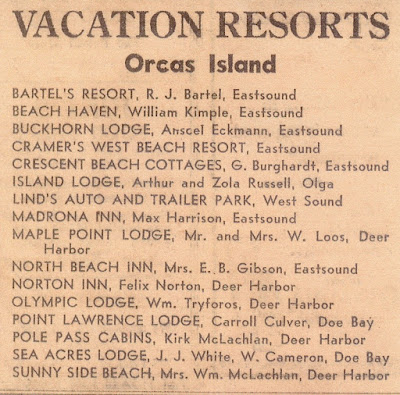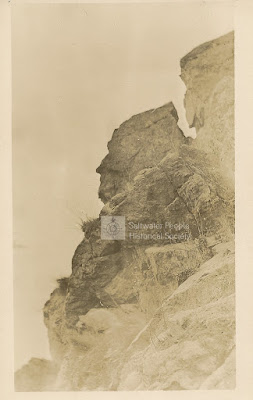"The thoughts of those summers working at Madrona Inn are filled with warm and nostalgic memories.
The location of Madrona Inn was on a small rocky spit that went out into the waters of Eastsound, Orcas Island. It was surrounded by tall firs and native Madrona trees. The small self-contained cabins were tucked along winding trails, craggy boulders, and trees at various places. The main lodge housed the dining room, kitchen, lobby, office, and sitting /library room. The style of the main lodge was rustic comfort having a large stone fireplace (usually lit,) solid homey chairs, and exposed dark oak ceiling rafters. Many window views overlooked the grounds and pristine water. The dining room tables always had tablecloths and flowers. Fresh water, tea, and coffee were available in the library. Although there were other inns and lodges on Orcas Island, Madrona Inn was considered unique and was usually well booked all summer. This was true until the privately owned Rosario Estate (near Eastsound) was sold and turned into a high-end resort.
The guests came year after year often for months at a time. They came from the cities in Washington, California, and other states. Meals were served three times a day with a set menu that rotated over a couple of weeks; some menu variations were also enjoyed–– such as a guest sharing a self-caught salmon. There were 12-14 college students who worked various jobs to fulfill the needs of the guests at the Inn. The jobs were housekeeping, waitress, dishwasher, hostess, laundry, pots and pans washer, building and grounds maintenance, etc. Seven to eight girls were selected as waitresses' they wore yellow uniforms and were assigned tables. Two people were in housekeeping; one was a rover covering those who had days off; one was a dishwasher, and one was a hostess. We, as employees, came from a variety of colleges in Washington, and other states and island residents were also part of the team. A two-story house was the home for the girls. Our meals were at the lodge and showers were at the bathhouse by the laundry. I remember the night some bats flew in through the open upstairs window. Some girls shrieked with fear and put towels over their heads. After that, there was always an open window check and often the lights were left on all night.
I worked as a dishwasher, waitress, and hostess over three summers. I remember serving meals to Mark Toby, a renowned artist, with some of his artist friends from Seattle and around the world. At the time I did not recognize his fame as an artist with work in the Louver in Paris. I also remember serving an evening meal to the Harrison family one Sunday night. Mr. Harrson's son, a distinguished and decorated U.S Army General from WA, D.C., and his family were visiting. I set a plate of bread on the table; my finger caught the edge of a slice of bread and the slice flipped over the flower arrangement into his soup. I was mortified!!! Many distinguished guests had their names on the sign-in roster. Mr. Max Harrison was an amiable proprietor––always wore a sports coat, usually had a cigar in his hand, and often cleared his throat with a "harrumph." Mrs. Harrison, a frail and gracious lady usually stayed in their private quarters.
 |
The Orcas Islander newspaper 26 July 1951 Always a front page source of information about the many resorts on Orcas Island, the guests, and the reports of the salmon being landed. |
By mid-summer, much of the produce came from local growers. Other groceries bought in bulk, came from the mainland by ferry or from the local grocery store. The boys often made grocery runs to the ferry or the store. As a kitchen helper, I remember shelling peas, washing lettuce, and strawberries, or helping with salads. On days when the kitchen was hot, it was good to step into the large walk-in refrigerator and rearrange things. As a waitress or cabin worker, you got to keep your tip money, therefore you tried to do your best to serve your people well.
On Saturday nights we rushed to get our work done because there was always the Island dance to attend. The dances were alternately held at the Eastsound Grange Hall or Deer Harbor on the other side of the island. The dances were attended by vacationers, visiting people from their yachts, the young men who worked at Camp Orkila, and many island residents. At about 11 P.M. food would be offered; it was usually a generous and welcome spread. The band played music from the 40s and 50s with some polkas and schottisches included. What fun we had as did most anyone there. When the dance at Eastsound ended we girls walked home amid giggles, teasing, and singing. Without street lights, the road was very dark and a bit scarey. As a postcard from Orcas Island claimed, "there was never a place as dark at night as Eastshoud on Orcas Island.
One memory stands out for me. In August of 1955 six of us girls were invited to be the guest of Mr. Donald Rheem at his Rosario estate. He and his wife purchased the estate in 1938 from the original owner Mr. Robert Moran. Rheem made extensive improvements to the estate property as well as building dock moorings for some of his well-known friends from California. John Wayne regularly visited each summer as did other celebrities. We (6 Madrona girls) were photographed for the Seattle Times as Rheem showed us the property. The photographer was the well-known Joseph Scaylea. It was a spectacular mansion on a wonderful site. Later, after it was sold, additions and other amenities were added to make it into an upscale resort; it lost some of its uniqueness and character.
Guest use of the Madrona Inn started to close down after Labor Day. Coed workers headed back to college of jobs; the cook, Mrs. Tharp went back to cook for the "Figi" fraternity at the U of W. Mr. and Mrs. Twedt continued as resident caretakers of the property and handled the off-season use of the property.
I think of the time spent there with fondness. At times I am reminded of the fresh air smell of the warm fir boughs. I hear the rustle of fallen leaves on the trails to the cabins. The boulders held the sun's summer warmth long after sundown. The night darkness, the brilliant stars, and at times the Aurora Borealis, are not forgotten.
Madrona Inn was a place where one could renew and refresh themselves––let the breezes wipe worries and care away. Guests came to write, paint, read, and reconnect with nature. With its comfortable and rustic setting, it provided a haven of rest for the patrons. It was a wonderful place for a college student to earn a wage, and find adventure while getting ready for the year ahead. There were so many things to do in the natural surroundings of the island––hiking, swimming, boating, fishing, and a visit to a local pottery shop or the store in Eastsound.
The views of Mt. Baker, Mt. Rainier, the Cascades, all the islands of Puget Sound, Vancouver Island, and so much more were and are always spectacular unless surrounded by fog. After hiking the trails we often stopped for a refreshing swim in Lake Moran at Moran State Park.
On one of my days off, my father met me at Buckhorn Lodge on the north side of the island and drove us in his 16-ft boat to Lummi Island where we had a cabin. In the middle of the Straits, I heard a swishing noise and all of a sudden about 20 Orcas came under and around our boat. As the boat rocked, I was filled with fear. Dad kept his cool and as quick as they came, the Orca pod continued on its way to hunt for food. What an experience to be so close to nature. I will not forget how much they need their freedom
in the sea just as we need ours on land."
Above words by Kathy Parker, September 2010.
The author of this letter mentions Dr. Agnes Harrison of Madrona Inn. There is more posted about this amazing woman here on this site.
Notices in the San Juan Islander newspaper promoting summer resorts and camping on Orcas Island in the 19th century:2 August 1894
"Orcas is overrun with campers from all over the Sound. This island has become an attractive summer resort and accommodations will be made for people who desire to spend the summer here."







